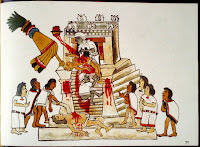When God sanctions killing, the people listen
 | New research published in the March issue of Psychological Science may help elucidate the relationship between religious indoctrination and violence, a topic that has gained renewed notoriety in the wake of the September 11th terrorist attacks. About this Image Aztec priest war god Huitzilopochtli |
The authors set out to examine this interaction by conducting experiments with undergraduates at two religiously contrasting universities: Brigham Young University where 99% of students report believing in God and the Bible and Vrije Universiteit in Amsterdam where just 50% report believing in God and 27% believe in the bible.
After reporting their religious affiliation and beliefs, the participants read a parable adapted from a relatively obscure passage in the King James Bible describing the brutal torture and murder of a woman, and her husband’s subsequent revenge on her attackers. Half of the participants were told that the passage came from the Book of Judges in the Old Testament while the other half were told it was an ancient scroll discovered in an archaeological expedition.
In addition to the scriptural distinction, half of the participants from both the bible and the ancient scroll groups read an adjusted version that included the verse:
"The Lord commanded Israel to take arms against their brothers and chasten them before the LORD."
The participants were then placed in pairs and instructed to compete in a simple reaction task. The winner of the task would be able to "blast" his or her partner with noise up to 105 decibels, about the same volume as a fire alarm. The test measures aggression.
As expected, the Brigham Young students were more aggressive (i.e. louder) with their blasts if they had been told that the passage they had previously read was from the bible rather than a scroll. Likewise, participants were more aggressive if they had read the additional verse that depicts God sanctioning violence.
At the more secular Vrije Universiteit, the results were surprisingly similar. Although Vrije students were less likely to be influenced by the source of the material, they blasted more aggressively when the passage that they read included the sanctioning of the violence by God. This finding held true even for non-believers, though to a lesser extent.
The research sheds light on the possible origins of violent religious fundamentalism and falls in line with theories proposed by scholars of religious terrorism, who hypothesize that exposure to violent scriptures may induce extremists to engage in aggressive actions. "To the extent religious extremists engage in prolonged, selective reading of the scriptures, focusing on violent retribution toward unbelievers instead of the overall message of acceptance and understanding," writes Bushman "one might expect to see increased brutality"
### Contact: Brad Bushman bbushman@umich.edu website: Association for Psychological Science
Technorati Tags: Psychological Science and religious indoctrination or scriptural violence and God and the Bible, or King James Bible and the Old Testament or religious fundamentalism and scriptures










